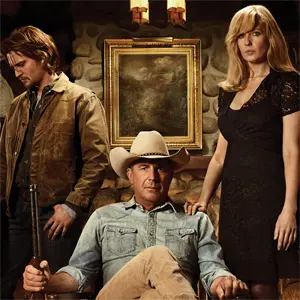It's strange that the massive cable hit Yellowstone isn't very buzzworthy
-

The Kevin Costner–led Paramount Network drama series, which returns for Season 4 on Sunday, is "the most-watched show everyone isn't talking about," says Tracy Moore. "It’s a sudsy contemporary Western about the Dutton family, the land they stole 150 years ago, their ruthless fight to fend off greedy developers, and the nearby Native Americans who intend to take it back," says Moore. "It stars Kevin Costner as patriarch John Dutton. It combines stunning cinematography with storylines reminiscent of Succession’s power grabs, The Godfather’s mob mentality, and Dallas’s bitchy in-fighting— except with cattle. It launches its fourth season with a two-hour premiere Sunday night on the Paramount Network. It’s also entirely possible you haven’t heard of it. Well, maybe you have. Big publications largely panned the show’s debut in 2018; one called it 'soapy trash that badly wants to be taken seriously.' A few critics have treated it worthy of recaps or deeper consideration. But it’s strange that given Yellowstone’s quantifiable success, it doesn’t enjoy the breathless analysis that usually accompanies shows this big. Mostly, you’ll find the fawning for Yellowstone on sites like Country Living, the blog Pioneer Woman, or on Instagram’s Yellowstone Memes, which revel in every cowboy quip—occasionally revealing politics that bleed red. This year for Halloween, Meghan McCain and husband Ben Domenech dressed up as the show’s romantic leads, Beth Dutton (Kelly Reilly)—a troubled but shrewd lush with the verbal subtlety of barbed wire—and Rip Wheeler (Cole Hauser), the ranch muscle she’s entangled with. Yellowstone has been called 'prestige TV for conservatives,' which explains a lot. 'People perceive all my stuff as red state, and it’s the most ridiculous thing,' (creator Taylor) Sheridan told the New York Times in 2019. If you truly look at this show…these are pretty wildly progressive notions. The people who are calling it a red-state show have probably never watched it. That may be. Or maybe it’s that Yellowstone buries its progressive notions in soapy scenes, over-the-top violence, and grandstanding soliloquies. But either way, Yellowstone is up to something curious. It’s an entertaining and sometimes graphically violent drama, but one that hooks viewers with entertaining brawls, complex family threads, and a willingness to (mostly) punch up. The show may not enjoy the prestige it wants, but it’s a clever conceit that pulls a nifty trick on its core audience."
ALSO:
- Yellowstone barely registers among people who talk about television on the internet: "The daughter’s love interest and a gangly goofball who has little to do with the main family unit form an unlikely comedic duo," says Emily VanDerWerff. "The family is beset on all sides by those who would slice up its empire and gobble it whole. Oh, and they spend a lot of time feuding with the government. Does that sound like an exact description of Succession? Because technically, it’s an exact description of Succession. But it’s also an exact description of a different cable drama that is significantly more popular, viewership-wise: the Paramount Network’s Kevin Costner-starring primetime soap Yellowstone. Where Succession takes place against the backdrop of the New York media world, Yellowstone takes place on a massive ranch in the middle of Montana. Does that make Yellowstone a red-state version of Succession? That’s a really reductive statement, so I’d never say that, but if you want to say it, I won’t stop you. Succession drew a respectable 564,000 viewers for its season three premiere in October. But Yellowstone drew 4.23 million viewers for its own season three premiere in June 2020. (It returns for season four on November 7.) And while a lot of Succession’s audience comes from streaming — which is impossible to measure as precisely as live TV viewership, and likely makes Succession more popular than its live ratings would suggest — Yellowstone, which also gains some viewership from streaming, is almost certainly still more popular. ... Compared to Succession, a prestige series on HBO and an established critical darling whose second and third seasons have been the subject of endless online discourse, Yellowstone barely registers among people who talk about television on the internet. But if you poke around online long enough, you’ll find a thriving Yellowstone fandom. There are T-shirts on Etsy! YouTube fan speculation videos with hundreds of thousands of views! A small but mighty collection of fanfics about the show’s main will-they/won’t-they pairing! Which means the secret hit must have tapped into something in the culture, right? Secret hits usually have. Maybe Yellowstone can tell us something about the way we live today. But Yellowstone, a watchable yet almost relentlessly three-out-of-five-stars TV show, is not particularly interested in saying anything grand or sweeping about the world. Instead, like so many TV hits before it, Yellowstone is comforting and loud, and it doesn’t rock the boat all that much. Ultimately, that might explain both its appeal and what it says accidentally, in the end, about America in 2021."
- Introducing the Yellowstone Dictionary: "In Yellowstone, there are dead brothers and dead mothers, corrupt politicians and devious fly fishermen, indentured cowboys and feral horses," says Katie Baker. "There are plans for the property that range from a casino to a ski resort, from a land grab to an airport. There are siblings—namely Jamie, Kayce, and Beth Dutton—who alternately jostle over and scoff at their birthright and the dark, deadly forces required to preserve it. Whether you’ve seen all three seasons or intend to skip right to the upcoming fourth, here are some people, places, phrases, and things that might help get you up to speed faster than Jimmy learned to ride a horse. Giddy up!"
TOPICS: Yellowstone, Paramount Network, Succession
More Yellowstone on Primetimer:
